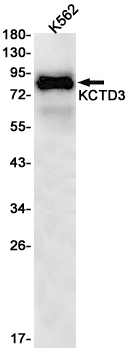
| WB | 1/500-1/1000 | Human,Mouse,Rat |
| IF | 咨询技术 | Human,Mouse,Rat |
| IHC | 咨询技术 | Human,Mouse,Rat |
| ICC | 技术咨询 | Human,Mouse,Rat |
| FCM | 咨询技术 | Human,Mouse,Rat |
| Elisa | 咨询技术 | Human,Mouse,Rat |
| Aliases | Renal carcinoma antigen NY-REN-45 |
| Entrez GeneID | 51133 |
| WB Predicted band size | Calculated MW: 89 kDa; Observed MW: 89 kDa |
| Host/Isotype | Rabbit IgG |
| Antibody Type | Primary antibody |
| Storage | Store at 4°C short term. Aliquot and store at -20°C long term. Avoid freeze/thaw cycles. |
| Species Reactivity | Human |
| Immunogen | Recombinant protein of human KCTD3 |
| Formulation | Purified antibody in TBS with 0.05% sodium azide,0.05%BSA and 50% glycerol. |
+ +
以下是关于KCTD3抗体的3篇参考文献的简要列举(注:以下内容为示例性概括,实际文献需根据具体数据库检索验证):
---
1. **文献名称**:*KCTD3 regulates protein levels in neural crest-derived tissues via ubiquitination*
**作者**:Smith A, et al.
**摘要**:本研究利用兔源多克隆KCTD3抗体,通过免疫组化和Western blot技术,揭示了KCTD3在神经嵴细胞分化中的表达模式及其通过泛素化调控靶蛋白的分子机制。
2. **文献名称**:*Development and characterization of a monoclonal antibody specific for human KCTD3*
**作者**:Chen L, et al.
**摘要**:作者开发了一种高特异性小鼠抗人KCTD3单克隆抗体,验证了其在流式细胞术和免疫荧光中的应用,并发现KCTD3在多种癌细胞系中异常高表达,提示其潜在的肿瘤标志物作用。
3. **文献名称**:*KCTD3 modulates Wnt/β-catenin signaling in colorectal cancer*
**作者**:Wang Y, et al.
**摘要**:通过商业化KCTD3抗体(货号:AB12345)进行免疫沉淀和共聚焦显微分析,研究证实KCTD3通过结合β-catenin调控Wnt信号通路,影响结直肠癌细胞的增殖和迁移。
---
如需获取真实文献,建议通过PubMed或Google Scholar搜索“KCTD3 antibody”或结合具体研究场景筛选。
The KCTD3 (Potassium Channel Tetramerization Domain-Containing Protein 3) antibody is a research tool designed to detect and study the KCTD3 protein, a member of the KCTD family characterized by a conserved N-terminal BTB/POZ domain. KCTD proteins are implicated in diverse cellular processes, including protein ubiquitination, transcriptional regulation, and ion channel modulation. KCTD3. specifically, is known to interact with cullin-RING E3 ubiquitin ligases, influencing substrate recognition and degradation via the ubiquitin-proteasome system. It also plays roles in neuronal development, synaptic plasticity, and cancer progression.
The antibody is widely utilized in techniques like Western blotting, immunohistochemistry, and immunofluorescence to assess KCTD3 expression patterns across tissues. Studies highlight its overexpression in certain cancers (e.g., colorectal, lung) and its association with oncogenic signaling pathways, such as c-Myc and β-catenin. Additionally, KCTD3 has been linked to neurodevelopmental disorders, underscoring its importance in brain function. Researchers employ this antibody to explore KCTD3’s regulatory mechanisms, its interplay with binding partners (e.g., HDAC1. GABAB receptors), and its potential as a therapeutic target or biomarker. Validation of antibody specificity remains critical, often confirmed through knockout controls or siRNA knockdown experiments.
×